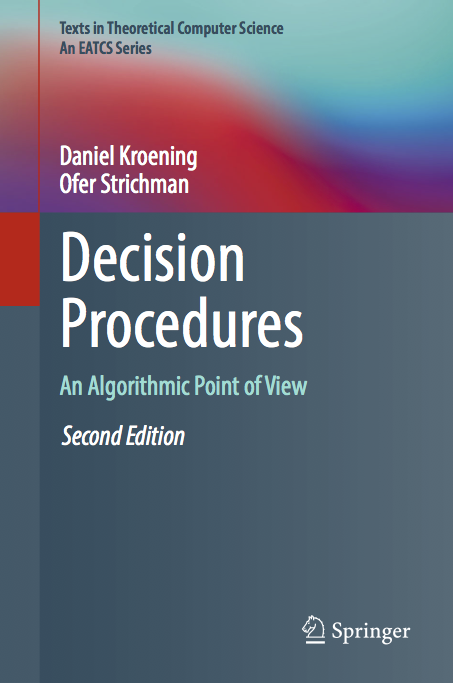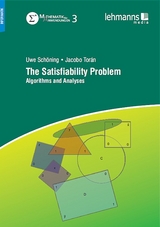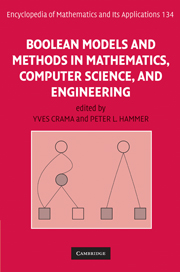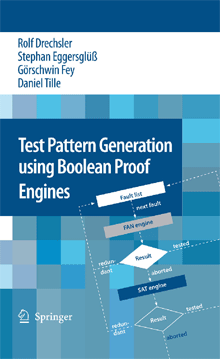SAT Live!
keep up to date with research on the satisfiability problem
Recent news about SAT subscribe via RSS
-
Apr 22, 2016 12th International Workshop on Boolean Problems by Miroslav Velev CFP Deadline
The Workshop on Boolean Problems has an emphasis on the problems related to the solution of all kinds of high- dimension Boolean and discrete problems, and provides a forum for researchers and engineers from different disciplines to exchange ideas. The workshop is devoted to theoretical discoveries as well as practical applications. An aim of the workshop is to initiate possible collaborative research and to find new areas of application. -
Mar 28, 2016 PB16 - Pseudo-Boolean Competition 2016 by Olivier ROUSSEL CFP Deadline PBO
The site for submitting pseudo-Boolean solvers or benchmarks to the 2016 competition will open soon. Like the previous evaluations and competitions (PB05, PB06, PB07, PB09, PB10, PB11, PB12, PB Evaluation 2015), the goal of PB16 is to assess the state of the art in the field of pseudo-Boolean solvers.
-
Mar 12, 2016 International Workshop on Graph Structure and Satisfiability Testing by Stefan Mengel CFP
The goal of the International Workshop on Graph Structure and Satisfiability Testing is to bring together researchers from different areas in which there is an interaction between graph structure and problems related to propositional satisfiability. The aim is to foster exchange between these areas by presenting different perspectives, results and current challenges. -
Mar 11, 2016 CFP - 4th International Workshop on Quantified Boolean Formulas (and Beyond) by Florian Lonsing CFP Deadline QBF
The goal of the International Workshop on Quantified Boolean Formulas (and Beyond) is to bring together researchers working on theoretical and practical aspects of QBF solving and related formalisms involving quantifiers. The workshop addresses theoreticians and practitioners in order to reflect on the state of the art in research and to consolidate on immediate and long-term challenges. -
Mar 3, 2016 CALL FOR BENCHMARKS -- SAT COMPETITION 2016 by Marijn Heule Competition Deadline
We would like to invite and encourage submissions of benchmarks and benchmark generators for SAT Competition 2016. Visit the competition homepage for details.
-
Feb 15, 2016 Final CFP - SAT 2016 - July 5-8, 2016 Bordeaux, France by Daniel Le Berre CFP Deadline
Final Call For Papers. Abstracts can still be submitted until Feb 21 (same deadline as papers). Submitted papers can be updated until Feb 24. -
Dec 23, 2015 SAT/SMT/AR summer school, Lisbon, Portugal by Philipp Rümmer SAT SMT
This year, the SAT/SMT summer school joins forces with the automated reasoning community to propose a SAT/SMT/AR summer school right before IJCAR.
-
Dec 22, 2015 QBFEVAL'16 - Competitive evaluation of QBF solvers by Luca Pulina CFP Deadline QBF
****************************************************************** Call for Solvers & Benchmarks QBFEVAL'16 - Competitive evaluation of QBF solvers A joint event with SAT 2016 - The Nineteenth International Conference on Theory and Applications of Satisfiability Testing - Bordeaux, France, July 5-8, 2016 ****************************************************************** -
Dec 22, 2015 International Workshop on Quantified Boolean Formulas by Florian Lonsing QBF
The website of the QBF16 workshop is online.
-
Dec 22, 2015 Seventh Pragmatics of SAT international workshop by Olivier Roussel CFP Deadline
The website of the seventh pragmatics of SAT international workshop is now online.
-
Dec 17, 2015 The SAT Revolution: Solving, Sampling, And Counting by Moshe Vardi by Daniel Le Berre Course
Moshe Vardi introduces NP-complete problems, P vs NP, SAT and related problems. -
Dec 14, 2015 Postdoc positions in SAT solving at KTH Royal Institute of Technology by Jakob Nordström PostDoc Position Deadline
The Theory Group at KTH Royal Institute of Technology invites applications for postdoctoral positions in SAT solving.
-
Dec 7, 2015 Second CFP - SAT 2016 - July 5-8, 2016 Bordeaux, France by Daniel Le Berre CFP Deadline
Second Call For Papers. Now includes programme committee. -
Oct 9, 2015 First CFP - SAT 2016 - July 5-8, 2016 Bordeaux, France by Daniel Le Berre CFP
The 19th international conference on Theory and Applications of Satisfiability Testing is taking place for the first time in France, in Bordeaux. -
Oct 6, 2015 VCLA International Student Awards by Florian Lonsing Awards
The Vienna Center for Logic and Algorithms announces the 2015 edition of the VCLA International Student Awards and calls for the nomination of authors of outstanding scientific works in the field of Logic and Computer Science, in the following two categories:
-
Sep 26, 2015 AAAI-16 Workshop on Beyond NP by Adnan Darwiche CFP
The goal of this workshop is to help unify and promote research areas that advance the design of solvers that reach beyond NP. -
Aug 19, 2015 SAT 2015: Early Registration Ends Soon! Student Grants Available! by Sean Weaver Registration
SAT 2015: Early Registration Ends Soon! Student Grants Available! -
Aug 6, 2015 SAT'15 Call for participation by Sean Weaver CFP
SAT'15 registration now open! -
Jul 15, 2015 FoSSaCS 2016 by Valentin Montmirail modal-logic CFP
19th International Conference on Foundations of Software Science and Computation Structures (FoSSaCS), April 2016, Eindhoven, The Netherlands. -
Jul 13, 2015 Advances in Modal Logic 2016 by Valentin Montmirail modal-logic CFP
11th International Conference on Advances in Modal Logic, 2016, Budapest, Hungary.
Our annual conference
Upcoming deadlines
- January 16, 2026
- PhD @ Lund










